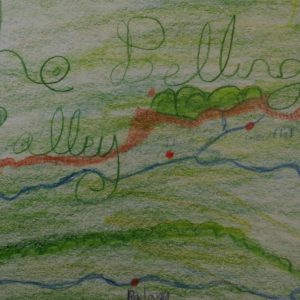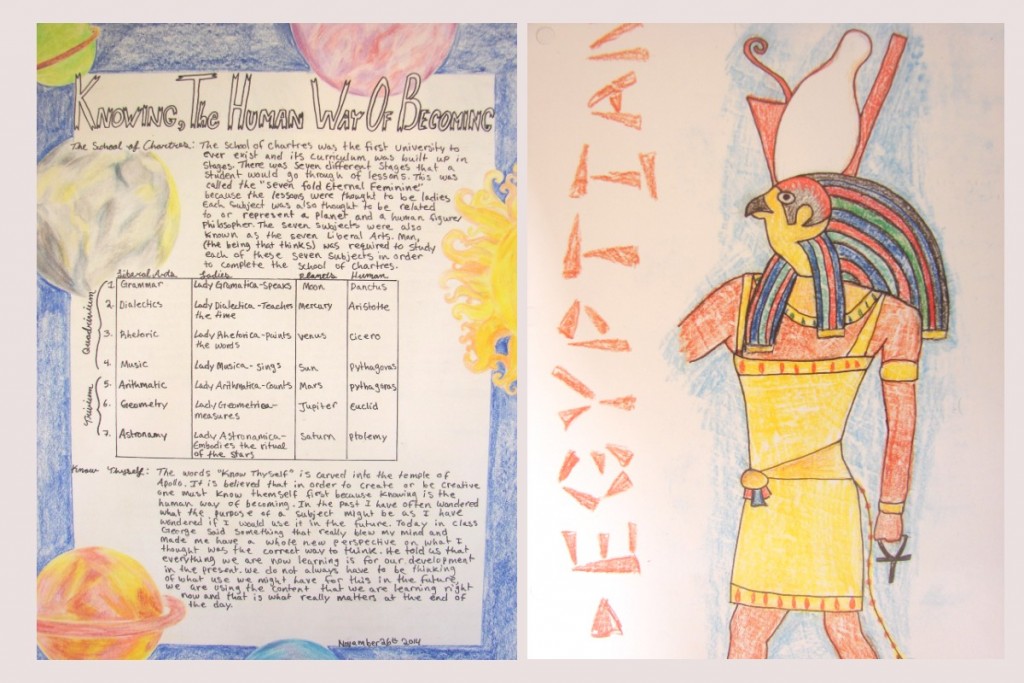

Main Lesson books are unique to Waldorf education. While traditional schooling pairs lecturing with textbook references and worksheets, Waldorf students process and record lectures in notes and illustrations on large, blank pages of high-quality paper.
What are these books exactly and why do Waldorf schools use them?
What is a Main Lesson Book?
The creation of a Main Lesson book is an active, hands-on experience of learning that encourages both intention and creativity. Waldorf students record content of each subject of study, presented during a student’s main lesson class, in a Main Lesson book.
These creative, curriculum-rich books become the culmination of all students have learned, in depth, for the year about a topic. These topics, such as History, Science and Mathematics to name a few, are taught in blocks averaging 4 to 6 weeks, and the books serve as both learning tools and documentation of the work learned.
Every Main Lesson features daily work in the Main Lesson book. The student writes and illustrates the lesson’s content into their books. This content consists of relevant illustrations, stories, notes and summaries all written by hand. Children are given freedom within the creation of their books about both what they write and how they illustrate. This makes both the book and the content of the lesson their own.
What is Its Purpose?
 The Main Lesson book serves many important purposes. On a practical level, it replaces the textbooks and worksheets seen in other schools. Instead of referencing a book as support material to what a teacher teaches, the teacher is the source material and the Main Lesson book becomes the creative, holistic recording of that imparted knowledge.
The Main Lesson book serves many important purposes. On a practical level, it replaces the textbooks and worksheets seen in other schools. Instead of referencing a book as support material to what a teacher teaches, the teacher is the source material and the Main Lesson book becomes the creative, holistic recording of that imparted knowledge.
In this way, students learn through listening and re-interpreting the teacher’s lessons into useable notes and bits of information — both recording and processing the information as they go along. This is done alongside creative and artistic representations of the material. This brings personalization, beauty, joy and relevancy to lessons.
The goal is better absorption of the material on a deeper level as well as inspiring a joy in learning. Children in Waldorf schools are learning to learn and learning to love learning. Memorization for tests or temporary learning, to simply prove out rote work, is never the goal. Main Lesson books, over worksheets and text books, help ensure that children learn meaningfully and deeply each and every day.
Does A Main Lesson Book Help with Learning?
Yes! Many research studies say this method absolutely boosts learning. The research is not about Waldorf Main Lesson books specifically, but it is about the effectiveness of drawing and hand note taking in relation to retention, recall and depth of learning.
Pam A. Mueller of Princeton University and Daniel M. Oppenheimer of the University of California, Los Angeles published this study in Psychological Science, which tested how note-taking by hand affects learning. Their results indicate that taking notes by hand helps students process material being presented as they go since they must summarize for their notes. The researchers call it “generative note-taking,” meaning that students “summarize, paraphrase, concept map” information during the lecture, which does not happen while not taking notes by hand. Students taking notes via computer were found to instead simply type what the teacher said verbatim. This lead to students not just remembering less information, but also having more difficulty putting information into context for divergent and critical thinking.
But what about the illustrations? Sure they’re fun for students, but are they useful for learning? Drawing has been linked to better memory in several studies.
In the New York Times article, A Simple Way to Remember Things, Draw a Picture writer, Tim Herrera, looks at several recent studies that show drawing can help young and old alike remember “word definitions, pictures, and abstract thoughts and ideas.” This is because turning to illustration when processing information relies on more areas of the brain, leading to “a seamless integration of semantic, visual and motor aspects of a memory trace,” which is neuroscience speak for “better recall.”
Are Main Lesson books fun for children to create? Yes. Are they treasured keepsakes for years to come? Absolutely. But they are also relevant tools for deep processing of information — a creative culmination of all that is being learned in the student’s day and year.
With thanks to Summerfield Waldorf School in California for this informative article.
